This article needs to be updated. (May 2023) |
Ali Hassan Khalil (Arabic: علي حسن خليل; born 15 July 1964) is a Lebanese politician, Member of Parliament, and former Minister of Finance.[1]
Ali Hassan Khalil | |
|---|---|
 Ali Hassan Khalil in 2016 | |
| Minister of Finance | |
| In office 15 February 2014 – 20 January 2020 | |
| Prime Minister | Tammam Salam Saad Hariri |
| Preceded by | Mohammad Safadi |
| Succeeded by | Ghazi Wazni |
| Minister of Health | |
| In office 13 June 2011 – 15 February 2014 | |
| Prime Minister | Najib Mikati |
| Preceded by | Mohamad Jawad Khalifeh |
| Succeeded by | Wael Abou Faour |
| Minister of Agriculture | |
| In office 17 April 2003 – 26 October 2004 | |
| Prime Minister | Rafic Hariri |
| Preceded by | Ali Abdallah |
| Succeeded by | Elias Skaff |
| Personal details | |
| Born | 15 July 1964 Khiam, Lebanon |
| Political party | Amal Movement |
| Spouse | Samia Saleh |
| Children | 4 |
| Alma mater | Lebanese University |
Khalil is described as the "second most powerful man" in Amal behind Parliament Speaker Nabih Berri.[2] He was sanctioned by the United States Treasury under the Magnitsky Act over "corruption" and "leveraging political power for financial gain".[3]
Career
editKhalil, who studied law at the Lebanese University,[4] is a member of parliament representing the Marjeyoun/Hasbaya district. He ran successfully in 1996, 2000, 2005, 2009, 2018 and 2022. He secured victory in the 2022 Lebanese general election for the "South 3" electoral district by garnering 13,155 votes as part of the "Hope and Loyalty" coalition.[5]
Khalil was appointed minister of public health in the cabinet of Najib Mikati on 13 June 2011.[6] Khalil's term ended when he was appointed minister of finance, replacing Mohammad Safadi in the post.[7]
He was appointed minister of finance on three occasions: February 2014 under PM Tammam Salam, December 2016 and January 2020 under PM Saad Hariri.
He was sanctioned by the United States Department of Treasury on September 8, 2020, for allegations of corruption and connections to the terrorist organization Hezbollah.[8]
In 2021, Judge Tarek Bitar issued an arrest warrant against Khalil after he failed to attend a scheduled interrogation[9] over alleged involvement in the 2020 Beirut explosion that claimed over 200 lives.[10]
In 2024, Judge Sabbouh Suleiman of the Court of Cassation revoked the warrants against Khalil due to a constitutional provision that protects members of parliament from arrest unless they are caught in the act of a crime or a vote is held to permit their prosecution.[11]
See also
editReferences
edit- ^ "Former Ministers". 18 December 2019. Archived from the original on 18 December 2019.
- ^ فوز, نادر. "فنيانوس وخليل.. من افتتاح أوتوستراد إلى لوائح العقوبات". almodon (in Arabic). Retrieved 12 July 2021.
- ^ Psaledakis, Humeyra Pamuk, Daphne (9 September 2020). "U.S. blacklists ex-Lebanese ministers over Hezbollah ties, vows more action". Reuters. Retrieved 12 July 2021.
{{cite news}}: CS1 maint: multiple names: authors list (link) - ^ Agency, National News. "Biography of State Minister for Financial Affairs Ali Hassan Khalil". National News Agency. Archived from the original on 2 February 2020. Retrieved 9 September 2020.
- ^ "2022 Parliamentary Elections Key Results" (PDF). UNDP. December 2022. Retrieved 15 August 2024.
- ^ "Ali Hassan Khalil". Beirut. Retrieved 2 October 2012.
- ^ "Lebanon announces new government after ten-month political deadlock". Euronews. 15 February 2014. Archived from the original on 23 April 2019. Retrieved 16 February 2014.
- ^ "Treasury Targets Hizballah's Enablers in Lebanon". United States Department of the Treasury. United States Government. 8 September 2020. Retrieved 15 August 2024.
- ^ "Lebanon prosecutor orders arrest of next-year politician charged over Beirut blast". Reuters. 14 December 2021. Retrieved 15 August 2024.
- ^ "Third Anniversary of the Beirut Port Explosion". U.S. Department of State. 4 August 2023. Retrieved 15 August 2024.
- ^ "Lebanon judge drops arrest warrants for suspects in port blast case". Associated Press. 7 January 2023. Retrieved 15 August 2024.